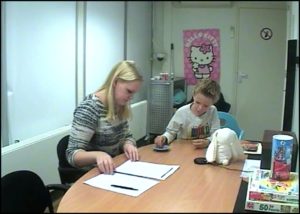Improve Children’s Generosity with Mindful Parenting
By John M. de Castro, Ph.D.
“To bring mindful attention and awareness into your interactions with your child really seems to set the stage for you to be a good parent,” – Justin Parent
Raising children, parenting, is very rewarding. But it can also be challenging. Children test parents frequently. They test the boundaries of their freedom and the depth of parental love. They demand attention and seem to especially when parental attention is needed elsewhere. They don’t always conform to parental dictates or aspirations for their behavior. The challenges of parenting require that the parents be able to deal with stress, to regulate their own emotions, and to be sensitive and attentive their child. These skills are exactly those that are developed in mindfulness training. It improves the psychological and physiological responses to stress. It improves emotion regulation. It improves the ability to maintain attention and focus in the face of high levels of distraction.
Mindful parenting involves the parents having emotional awareness of themselves and compassion for the child and having the skills to pay full attention to the child in the present moment, to accept parenting non-judgmentally and be emotionally non-reactive to the child. Mindful parenting has been shown to have positive benefits for both the parents and the children. So, it is important to further investigate the nature of the effects of mindful parenting on the behavior of children.
In today’s Research News article “The Role of Mindful Parenting in Individual and Social Decision-Making in Children.” (See summary below or view the full text of the study at: https://www.frontiersin.org/articles/10.3389/fpsyg.2019.00550/full?utm_source=F-AAE&utm_medium=EMLF&utm_campaign=MRK_943967_69_Psycho_20190326_arts_A), Wong and colleagues recruited mothers and children who were 4 to 6 years old. The mothers completed a measure of mindful parenting. The children were asked to select a single toy from a chest containing a number of toys. They were rated for time to decision making, decision-related stress, doubt/indecisiveness, and confirmation seeking. The children were also examined for how many stickers that they were willing to share with a stuffed bunny character after the bunny shared some with them.
They found that there were no significant relationships between mindful parenting by the mother and any measure of the child’s decision making. But there was a significant relationship between mindful parenting and the child’s sharing behavior such that the greater the mother’s mindful parenting, the greater the sharing behavior by the child.
These are interesting findings that mothers who parent mindfully have children who share more generously. It is not known why this would be true. But it can be speculated that mindful parents are themselves more generous toward the child which affects the child’s generosity. Regardless, this higher sharing may result in greater prosocial behaviors as the children grow into adulthood. This is another example of the positive effects of mindful parenting.
So, improve children’s generosity with mindful parenting.
“Mindful mornings may be less efficient, but they’re more pleasurable. ‘What’s happening right now is all there is. Why make everybody unhappy? If we’re five minutes late to preschool it doesn’t change anything. What changes things is the frustration, and the stress that builds up and then everything unravels.’” – Juliann Garey
CMCS – Center for Mindfulness and Contemplative Studies
This and other Contemplative Studies posts are also available on Google+ https://plus.google.com/106784388191201299496/posts and on Twitter @MindfulResearch
Study Summary
Wong K, Hicks LM, Seuntjens TG, Trentacosta CJ, Hendriksen THG, Zeelenberg M and van den Heuvel MI (2019) The Role of Mindful Parenting in Individual and Social Decision-Making in Children. Front. Psychol. 10:550. doi: 10.3389/fpsyg.2019.00550
Children are confronted with an increasing amount of choices every day, which can be stressful. Decision-making skills may be one of the most important “21st century skills” that children need to master to ensure success. Many aspects of decision-making, such as emotion regulation during stressful situations, develop in the context of caregiver-child interactions. This study examined whether mindful parenting predicts children’s individual and social decision-making. The current study included 63 mother-child dyads from The Netherlands (Child Mage = 5.11, SD = 0.88, 50.8% girls). Mothers completed the Dutch version of the Interpersonal Mindfulness in Parenting Scale (IM-P). A “Choice Task” was developed to measure individual decision-making skills, and a “Sharing Task” was created to measure social decision-making in young children. Higher maternal mindful parenting significantly predicted more sharing after controlling for covariates (child age, sex, SES, maternal education level; Wald = 4.505, p = 0.034). No main effect of maternal mindful parenting was found for any of the individual decision-making measures. These findings suggest that mindful parenting supports children’s social decision-making. Future research should investigate if the combination of mindful parenting and children’s early decision-making skills predict key developmental outcomes.
